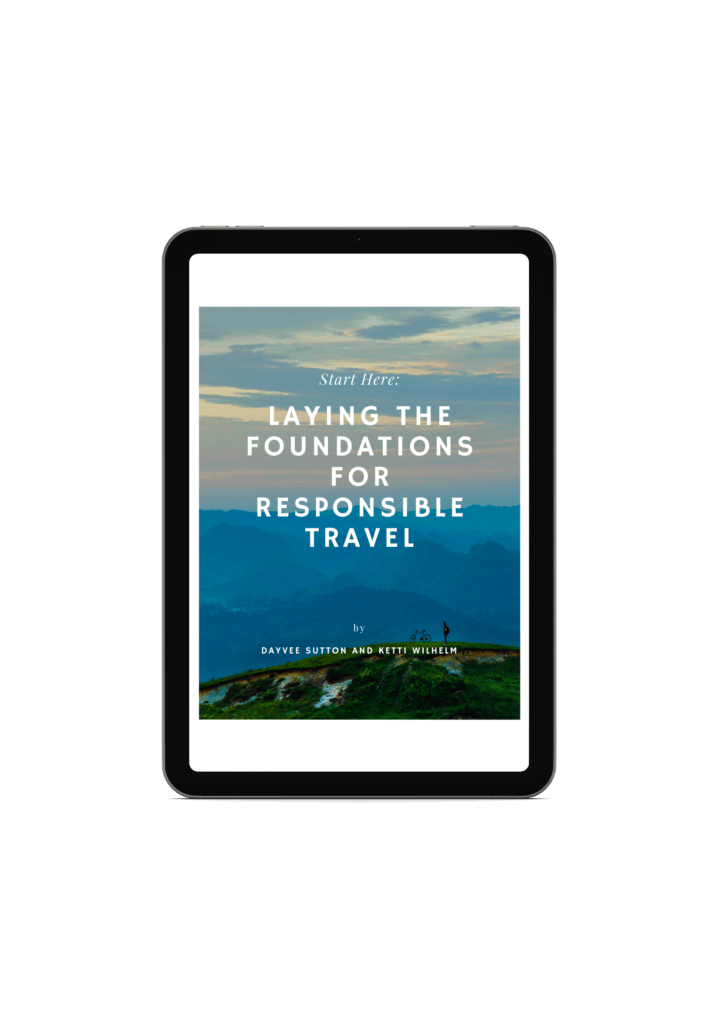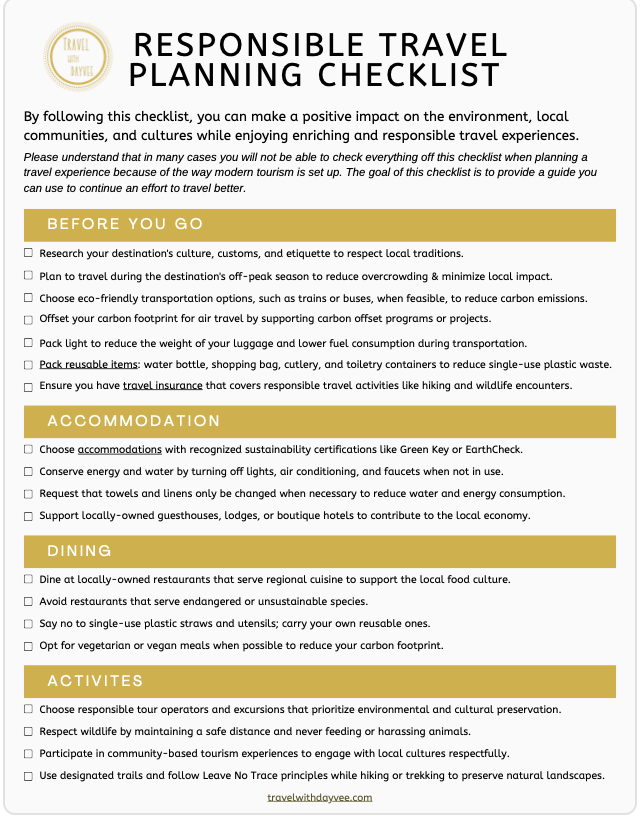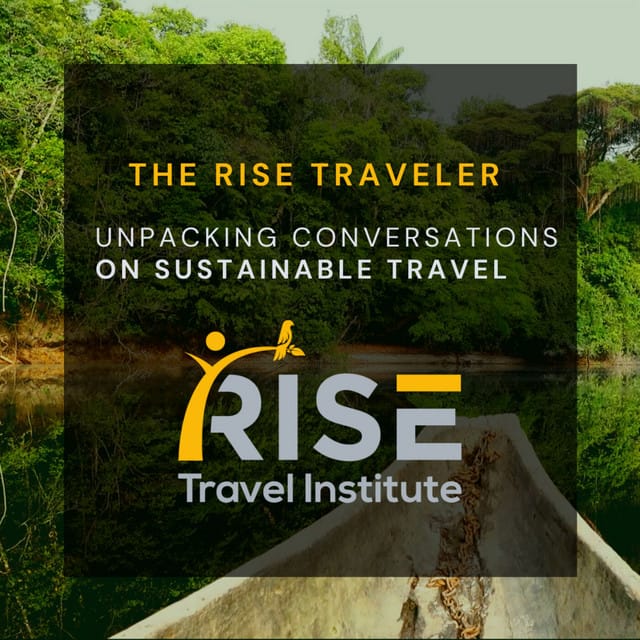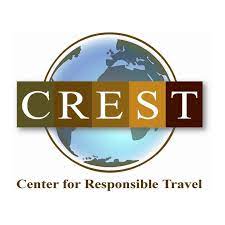Breaking Down Responsible Travel:
A Comprehensive Guide for All Travelers
Table of Contents
Responsible Travel is not a niche.
Implementing principles for sustainability within the tourism industry should be applied on all levels. But the ideas can be daunting. This page will guide you to the best sources, tools, and resources on how you can immediately practice the pillars of responsible travel.
- Things To Do In Labuan Bajo
- Padar Island
- Sanur Bali
- Calakmul Biosphere Reserve
- Best Spa In Singapore
- Chicago Bean History
- Komodo Island Pink Beach
- Selva El Ocote Chiapas
- Sak Yant Tattoo
- Hotels With Eiffel Tower View
- Best Restaurants In Singapore
- Chichen Itza
- German Black Forest
- Mont Saint-michel
- Yucatan Peninsula
- Nusa Penida
- Things To Do In Cancun
- Wonders Of The World
- Things To Do In Venice
- Filipino Dishes
- Best Places To Stay In Bali
- Best French Foods
Responsible travel, often referred to as sustainable or ethical travel, represents a transformative shift in the way we explore the world. It’s not merely a trend but a global movement that recognizes the profound impact travel has on our planet and its people. At its core, responsible travel urges us to travel with consciousness and compassion, acknowledging that our journeys can be a force for positive change.
Why is Responsible Travel Important?
The answer lies in the undeniable connection between travel and the environment, local communities, and cultural heritage. Here’s a glimpse of why responsible travel matters:
- Things To Do In Labuan Bajo
- Padar Island
- Sanur Bali
- Calakmul Biosphere Reserve
- Best Spa In Singapore
- Chicago Bean History
- Komodo Island Pink Beach
- Selva El Ocote Chiapas
- Sak Yant Tattoo
- Hotels With Eiffel Tower View
- Best Restaurants In Singapore
- Chichen Itza
- German Black Forest
- Mont Saint-michel
- Yucatan Peninsula
- Nusa Penida
- Things To Do In Cancun
- Wonders Of The World
- Things To Do In Venice
- Filipino Dishes
- Best Places To Stay In Bali
- Best French Foods
Travel, especially when done en masse, can harm fragile ecosystems, deplete natural resources, and contribute to climate change. Responsible travel aims to minimize these negative impacts by adopting eco-friendly practices and supporting conservation efforts.
Tourism can lead to the erosion of indigenous cultures and traditions. Responsible travel respects local customs, engages with communities respectfully, and promotes cultural preservation, ensuring that these unique identities endure for generations.
Tourism has the potential to lift communities out of poverty. Responsible travel encourages spending on local businesses, creating jobs, and fostering economic stability within destinations.
It’s about leaving a positive mark on the people you encounter during your travels. Responsible travelers strive to connect with locals, understand their needs, and contribute positively to their well-being.
By embracing responsible travel, we help ensure that the destinations we love remain beautiful, vibrant, and accessible for future generations.
As a veteran travel professional, I learned early in my career in travel journalism that there is no separation between the environment and tourism. I also understood, even as someone who studies the issues, that some of the concepts can be overwhelming. I passionately believe in the importance of including principles of ethical and sustainable travel in my work. On Earth Day 2023, we published a white paper I co-wrote with Ketti Wilhelm from Tilted Map. Knowing that the topic of responsible travel is important, but often not understood, we wanted to write an easy-to-read but comprehensive resource for responsible travel.
Scan QR to view flipbook on another device.

Featured on



@dayveesutton Check this and other resiurces tibhelp you travel better #linkinbio #earthday #responsibletravel #sustainabletravel @tiltedmap ♬ Vlog - Soft boy
I create this content that will be free for you to use…forever.
But, if you’d like to show support for my work in the form of $tip$, it really does help the mission.
Responsible Travel Principles and Tips
Key Principles of Responsible Travel
Minimizing Environmental Impact
Supporting Local Communities
Respecting Cultures
Responsible travel is grounded in a set of core principles. First, it revolves around the principle of “minimizing environmental impact.” This involves making conscious choices to reduce our carbon footprint, conserve resources, and protect the natural beauty of our destinations.
Another vital principle is “supporting local communities.” This means opting for locally-owned accommodations, dining at neighborhood eateries, and shopping at local markets, ensuring that your travel spending directly benefits the people who call these places home.
Finally, “respecting cultures” is a cornerstone of responsible travel. It encourages travelers to engage respectfully with local traditions, customs, and practices. By doing so, we create meaningful connections, foster cultural preservation, and promote global understanding. These principles collectively serve as a compass guiding us towards journeys that are not only memorable but also leave a positive and lasting impact on the places we visit.
Practical Tips for Responsible Travel
Here’s some actionable advice on how travelers can apply these principles. By incorporating these practical tips into your travel plans, you not only enrich your own experience but also contribute positively to the places you visit, leaving a responsible traveler’s mark on the world.
Minimize your environmental impact by packing reusable items like water bottles, shopping bags, and cutlery. When you can, choose accommodations and sustainable tours that have eco-friendly practices, like waste reduction and energy conservation.
To back local communities, dine at independent restaurants, shop at local markets, and choose family-run accommodations. This way, your spending goes directly into the pockets of the people who make your travel experience special.
Before visiting a new place, take the time to learn about local customs, traditions, and etiquette. Show respect by dressing appropriately, asking for permission before taking photos, and refraining from behaviors that may offend the local culture.
If wildlife experiences are on your agenda, opt for responsible tour operators that prioritize animal welfare and conservation. Avoid activities that involve captive or exploited animals.
Carry a reusable water bottle and say no to single-use plastics. Many destinations now have refill stations or filtered water options, so you can keep hydrated without contributing to plastic pollution.
Be mindful of your energy and water consumption in accommodations. Turn off lights, air conditioning, and taps when not in use to conserve resources.
When shopping for souvenirs, look for items that are locally made and support artisans. Avoid purchasing products made from endangered species or materials that harm the environment.
If you’re into hiking or trekking, stick to designated trails and respect the natural environment. Don’t leave any trash behind, and consider participating in clean-up initiatives if available.
Choose public transportation, walk, or bike when exploring cities. It’s often a more eco friendly travel plan and allows you to engage more deeply with local life.
Consider giving back to the communities you visit through responsible tourism initiatives or volunteering programs.
Responsible Travel Products & Services
I independently research, test, review, and recommend the items listed on this page, which contains some affiliate links. If you buy something through my links, I may earn a small commission. Some affiliate links will also offer a discount just for you just for clicking through using my link. So thanks for supporting my work by simply shopping for the things you like.
Below is a curated list of services, travel booking platforms that promote and/or align with responsible travel practices.
These businesses come highly recommended from me to you!
Thank you for using my links.

Sustainable Places to Stay
Use the "Travel Sustainable" filter
Booking.com offers a search that allows you to filter through hotels and accommodations that report as eco-friendly. Take advantage of even deeper "Genius" discounts by creating or logging in your Booing.com account.


For Accommodations, Flights, and More
Google's Accountability Tools
If you want to view only flights that have lower emissions compared to the average for similar trips, simply tap the “Low Emissions” filter on Google Flights. When you search for hotels, select the “Eco-certified” filter and the view will update so you can browse a list containing only eco-certified properties.

Find an Eco-Conscious Travel Advisor
Pay the same. Get WAY more.
I've partnered with Fora travel agency where sustainable travel is the foundation for every trip booked. Let me direct you to the perfect advisor for you who has a passion for a conscious approach to seeing the world.

Experience a homestay
Don't just visit. Live it!
Doing a night or few in a local's home offers you the opportunity to live with a local and to truly discover your destination. This is the quickest way to immersion, and actually how a lot of travel was done around the world for ages!
Other Services for Your Eco-Travel Stay

Book Local Guides
Local Guides are local experts
You will not have a more authentic experience than taking a tour from someone who is from the place you are visiting. It's their home! This also supports local businesses and prevents tourism leakage.

Reduce The Burden on Locals
Break Glass In Case of Emergency
Should your worst travel nightmares come true, you will be covered. That alone is worth the investment. Having travel insurance in place will help local safely and quickly resolve your situation.

Learn the Local Language
One move towards anti-oppression
Learning the language, or at least a few words, can help make it easier to travel. But, many people don't realize that language learning can help you fight back against biases. While learning a language you will have opportunities to learn about other cultures and interact with people of different races.

Stay connected without extra waste
No more roaming fees Get an SIM and go online anywhere in the world
Airalo's eSIM services allow you to easily stay connected when you travel abroad. It's easy to use and offers reliable connectivity in most destinations, often at a cost that's cheaper than using your US mobile plan. Available in more than 200 countries, Airalo is a must-have for international travel.
The following are my picks of eco-friendly gear that I actually use and recommend for you.
Curated for you on my Amazon Storefront
Thanks for supporting my work by using my links if you see something you like.
Do you have a must-have travel essential? Let me know and I’ll test it out.
Responsible Travel Resources
Tools
Carbon Footprint Calculator
Calculate Your Trip's Footprint
We all can contribute in our own ways to a more sustainable tourism industry.
I’ve added this tool for you to easily access when you want to make low carbon choices for your travel.
Native Land Map
This Land is Their Land
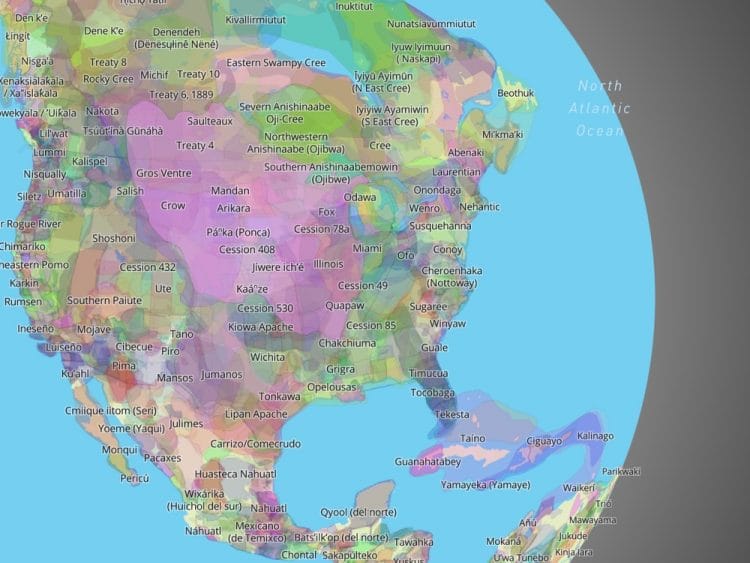
Native Land is clear that their map does not represent or intend to represent official or legal boundaries of any Indigenous nations. To learn about definitive boundaries, you should contact the nations in question.
Also, the map is not perfect — it is a work in progress with tons of contributions from the community. If you see something that is an error, please directly contact Native Land to make them aware.
If you would like to read more about the ideas behind the Native Land project, click the button below.
If you have any questions, feedback or advice about my work and coverage with Indigenous and local cultures, please contact me. I am always looking to improve my impact in this space.
Native Land is an app to help map Indigenous territories, treaties, and languages.
Native Land’s mission is to map Indigenous lands in a way that changes, challenges, and improves the way people see history and the present day. Their hope to strengthen the spiritual bonds that people have with the land, its people, and its meaning.
"Land is something sacred to all of us, whether we consciously appreciate it or not — it is the space upon which we play, live, eat, find love, and experience life. The land is ever-changing and ever-shifting, giving us — and other creatures and beings on the earth — an infinite number of gifts and lessons."
Dayvee Sutton"Land acknowledgments are just the least we can do if we are sincere in wanting to present offerings of sincere remorse and provide authentic pathways towards the healing from the intentional genocide of Indigenous People and the thievery of their sacred lands."
Implementation
My coverage includes sharing stories and amplifying the voices of local communities in the destinations I travel to. In an effort to use my platform in allyship with Indigenous and Native people around the world, you will often see the following note in my work.
In this post I promote travel to destinations that are the traditional lands of local Indigenous People. I make a formal land acknowledgment, extending my appreciation and respect to the past and present people of these lands. To learn more about the peoples who call these lands home, I invite you to explore Native-Land.ca.
Responsible Travel Planning Checklist
Responsible Travel Apps

For vegan and vegetarian travelers, HappyCow helps you discover plant-based restaurants and cafes around the world, promoting eco-friendly dining options.
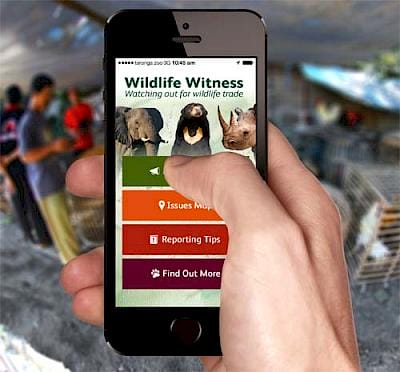
For vegan and vegetarian travelers, HappyCow helps you discover plant-based restaurants and cafes around the world, promoting eco-friendly dining options.

Ideal for budget and eco-conscious travelers, this app lists free and low-cost camping spots, hostels, and other accommodations, often in off-the-beaten-path locations.
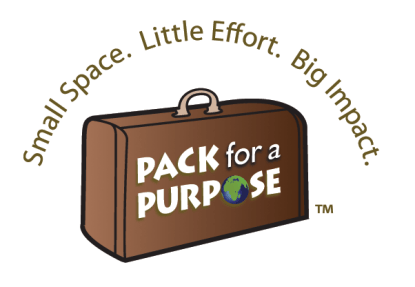
This app provides a list of items needed by local schools and community projects at your travel destination. You can pack these supplies in your luggage and make a positive impact on the local community.
Sustainable Travel Packing List
Coming soon!
Books and Guides
This guide motivates travelers to take a responsible approach to the impact of traveling.
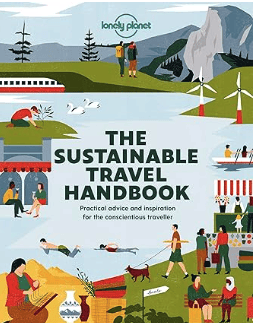
This guide will provide a comprehensive but succinct overview of why we all need to put the pillars of responsible travel at the forefront of every trip.
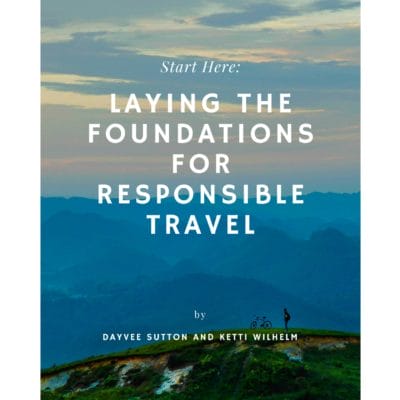
This book profiles twenty-five species and one endangered ecosystem, highlighting local eco-friendly travel outfitters operating in the area for those seeking out their own enriching personal experience with wildlife.

This guide delves into sustainable travel options, eco-friendly accommodations, and tips for reducing your environmental impact while exploring the world.
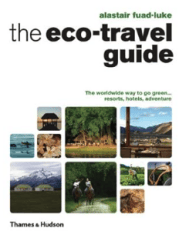
This book takes a critical look at the travel industry and its impact on the world, shedding light on both positive and negative aspects of tourism.

This book provides a philosophical framework for embarking on more meaningful and purposeful travels, whether it is an around-the-world journey, or an exploration of a region, or even a city.
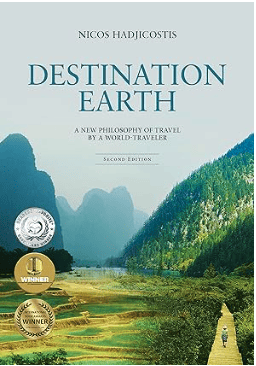
Blogs and Websites
An award-winning blog that focuses on ecotourism, wildlife conservation, and sustainable travel. They provide in-depth articles, destination guides, and responsible travel tips.
A resource for actionable, approachable advice on sustainable travel and lower-impact living. Readers come to Tilted Map for destination guides to help make any kind of trip more sustainable, how to find flights with lower climate impact, useful reviews of plastic-free products, and lots more!
An inspiring sustainable travel blog by a UK-based travel writer and corporate tourism professional Ellie. The blog posts and guides on Soul Travel highlight eco-lodges, wellness retreats, community projects that promote gender equality, and other responsible travel experiences.
Started by a freelance journalist, podcast host, and blogger, The Altruistic Traveler promotes compassion and ethics in tourism. You can find content about sustainable tourism, spending local, supporting community development, and responsible volunteering.
Its founder Alyse encourages readers to see the best of what a destination has to offer while making every attempt to blend in. It all comes down to respect.
Charities and Organizations
Rise’s mission is to inspire responsible, impactful, sustainable and ethical travel through education. They offer courses and experiential trips to help you practice the things you learn through their programs.
The Global Sustainable Tourism Council (GSTC) establishes and manages global sustainable standards, known as the GSTC Criteria. There are two sets: Destination Criteria for public policy-makers and destination managers, and Industry Criteria for hotels and tour operators.
Founded by Prince Harry, The Duke of Sussex, Travalyst is a coalition with a mission is to provide travelers with transparent, actionable information to make more sustainable choices.
A UK-based organization dedicated to promoting sustainable tourism. Their website features insights, reports, and resources on responsible travel.
A not-for-profit organization created to have a positive impact on the people and communities people visit, to protect wildlife and marine life, and to care for the planet.
CREST’s website includes research reports, publications, and articles on sustainable tourism and responsible travel practices.
Since 2002, Sustainable Travel International has been working to improve lives and protect places by providing businesses and destinations with the guidance and support they need to plan responsibly for the future.
Wanderful help travel companies tell award-winning stories that represent all women, while creating a supportive and inclusive ecosystem for women worldwide.
The mission of the Black Travel Alliance is to support Black content creators around the world and increase their representation in the travel industry via various avenues, such as employment, conferences, and media.
Travel Unity is a nonprofit focused on increasing diversity in the world of travel through individual and community empowerment.
This organization gathers and provides information on how tourism can help and not harm the natural, cultural, and social quality of destinations around the world. They seek to build a global community and knowledge network for advancing this goal.
Do you have some more recommendations to implement the three pillars of sustainability in tourism? I’m happy to learn additional tips.


Learn more about my reporting and work in Responsible Travel by clicking the button below.
Frequently Asked Questions
What is responsible travel?
The question also follows: What does sustainable travel mean?
Responsible travel, also known as sustainable or ethical travel, involves making choices that minimize the negative impact of tourism on the environment, local communities, and cultures while maximizing the benefits for all stakeholders involved.
Why is responsible travel important?
Responsible travel is crucial for preserving the world’s natural and cultural heritage, reducing carbon emissions, supporting local economies, and fostering respectful interactions between travelers and host communities.
How can I practice responsible travel?
You can practice responsible travel by choosing eco-friendly accommodations, supporting local businesses, respecting local customs and cultures, conserving resources, and engaging in ethical wildlife encounters, among other actions.
What are some eco-friendly travel options?
Eco-friendly travel options include staying in certified green accommodations, using public transportation, reducing plastic waste, conserving energy and water, and participating in eco-friendly activities and tours.
How can I find eco-friendly accommodations?
Look for accommodations that lead with the ethics and principles learned on this page and in our white paper. In our Responsible Travel Products & Services section, there are tools to plan domestic and international sustainable travel.
What are some ethical wildlife encounters while traveling?
Ethical wildlife encounters involve observing animals in their natural habitats, supporting conservation initiatives, and avoiding activities that exploit or harm animals, such as wildlife selfies or riding elephants.
How can I reduce my carbon footprint while traveling?
To reduce your carbon footprint, consider offsetting your flights, using public transportation, choosing non-stop flights, packing light, and staying in energy-efficient accommodations.
What should I do to respect local cultures and customs?
Research local customs and etiquette before your trip, dress modestly when required, ask for permission before taking photos of people, and engage with local communities respectfully.
How can I support local communities during my travels?
Support local communities by dining at locally-owned restaurants, shopping at local markets, staying in locally-run accommodations, and participating in community-based tourism experiences.
Are there any resources or apps for responsible travel?
Yes, there are several apps and websites that provide information and tools for responsible travel, including eco-friendly travel guides, ethical wildlife encounter apps, and carbon footprint calculators.
What is voluntourism, and how can I participate responsibly?
Voluntourism involves volunteering while traveling. To participate responsibly, choose volunteer opportunities that align with your skills and interests, research the organization’s impact, and ensure your contribution is ethical and sustainable.
How can I choose responsible tour operators and activities?
Look for tour operators that prioritize responsible tourism, follow environmental and cultural preservation practices, and support local communities. Read reviews and ask questions about their responsible practices.
What is sustainable tourism, and how does it differ from responsible travel?
Sustainable tourism is a broader concept that encompasses responsible travel. It includes efforts to minimize the environmental, social, and economic impacts of tourism, often involving destination-wide strategies and policies.
Can responsible travel help combat over-tourism?
Yes, responsible travel practices, such as traveling during off-peak seasons, supporting less-visited destinations, and respecting local carrying capacities, can help mitigate the negative effects of over-tourism.
How can I find ethical and sustainable souvenirs while traveling?
Look for locally-made products from artisans and cooperatives, avoid purchasing items made from endangered species or materials that harm the environment, and prioritize fair trade products.
Your Ultimate Takeaway: The impact of tourism on a local destination, economy, and community can be positive as well as negative. It’s nuanced, which means that being a responsible tourist is also nuanced.
If you appreciate this content, please share it with fellow travelers who are interested in being a responsible traveler.
TRAVEL WITH DAYVEE Newsletter
Subscribe to my newsletter and get my picks for where to go, tips on how to plan, the scoop on travel news, and special access and discounts just for my subscribers!

